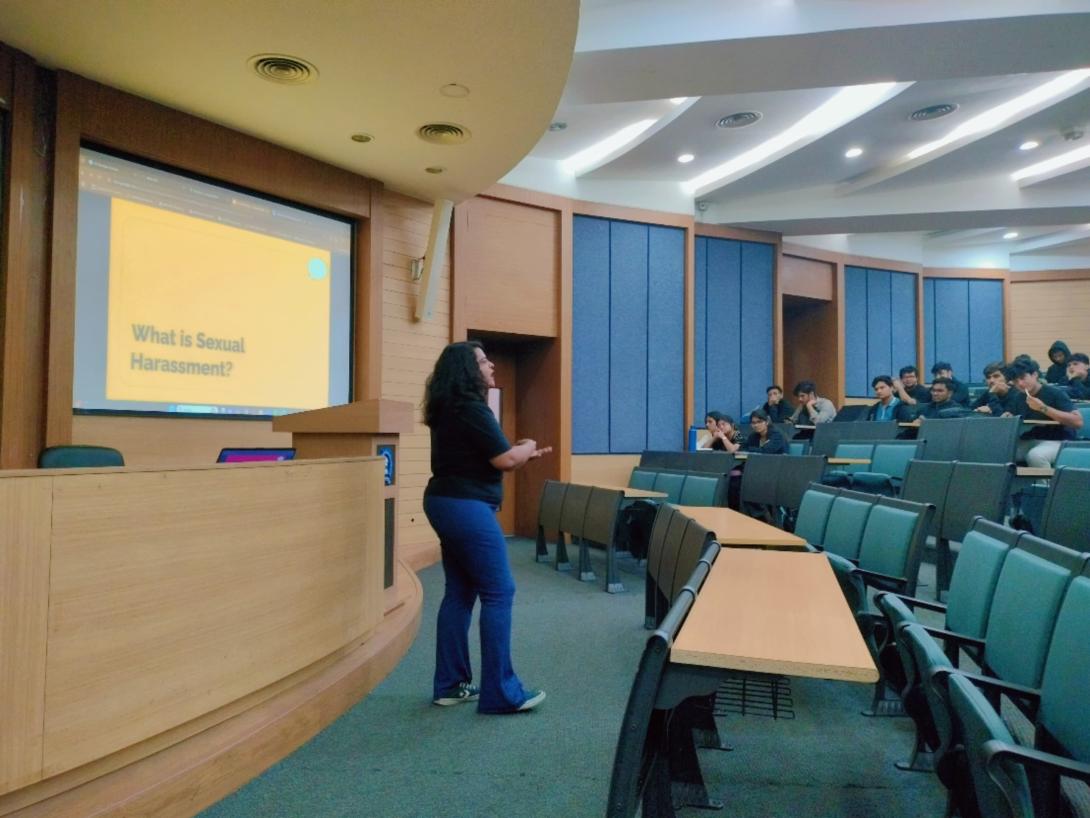IIT Bombay’s Women's Cell has been in existence since 2002. With the enactment of the Institute's policy on sexual harassment, the Cell has been renamed the Gender Cell (GC).
The IIT Bombay Gender Cell (GC) inquires into complaints of sexual harassment through its Internal Complaints Committee (ICC). The GC and ICC strive to work towards an egalitarian environment where men and women are afforded equitable treatment and equality of opportunity.

Gender Amity
Promote equality, gender justice and non-discrimination.
Workshops & Training
Organize workshops and training programmes to sensitize students and employees.
Inquiry and Action
Internal Complaints Committee (ICC) inquires into complaints in a fixed time frame and recommends action.
What is sexual harassment?
The definition of sexual harassment is broad enough to include different kinds of offensive, hostile, intimidating, humiliating and exploitative language, gestures and conduct. It is important to note here that what constitutes sexual harassment is defined by the person experiencing it, and not by the perpetrator.
Sexual harassment is defined as unwelcome sexual behaviour such as (but not limited to) the following.
Contact
Female QRT (Quick Response Team) in-charge:+91 9167398598
QRT : +919833337979, +919833338989
Office Address:
3rd Floor, N.N.
Next to Student Wellness Center,
IIT Bombay, Powai, Mumbai - 400 076.
Extension: 5052
Email: gendercell@iitb.ac.in
Types of sexual harassment:
Visual
Suggestive gestures, showing/sharing pornography.
Physical
Physical contact, gestures, or stalking. Unwelcome physical conduct of a sexual nature.
Verbal
Sexually coloured communication.
Demands
Asking for sexual favours in return for something (grades, promotion).
What happens when I complain?
Receive:
Email/letter from complainant
Respond:
In 1-2 days; organize initial meeting
Meeting:
Discuss concerns; provide options
Decision:
Complainant decides how to proceed
Actions:
Mediation; sensitization; formal complaint.
GC-ICC Committee
Prof. Vaijayanthi Sarma (Convener), and Prof. Nandita Madhavan (Co-Convener)
(Names in bold are also members of the ICC)
Prof. Arti Kalro
Prof. Prachi Mahajan
Prof. Krishna S.
Prof. Bakul Rao
Prof. R. P. Vedula
Ms. Pramila Sasalekar
Ms. Padmaja R. Nair
Arpita Kumari (IGN, UG)
Sneha Susan George (PG)
Haritha Songola (PG)
Adv. Veena Gowda (External Member)
Dr. Chayanika Shah (External Member)
Dr. Asha Achuthan (External Member)
Prof. S. Akshay
Prof. Sharayu Moharir
Ms. Archita Patkar
Ms. Tanvi Mehta
Prof. Prabhu Ramachandran (Head, CC, Ex-officio)
Dr. S.G. Patil (Liaison Officer, Ex-officio)
Prof. Swati Patankar (GATI, Ex-officio)
Prabhat Sharma (ISHA, UG)
Rohan Bajaj (PG)
Shruti Manohar Ahuja (PG)
The following are some important official documents regarding sexual harassment at the workplace, including Indian Government acts and reports, international conventions and research papers.
The following are links to videos, articles, art work and organisations that address sexual harassment in diverse ways. All reasonable efforts have been made to ensure these are current and reliable. However, the Gender Cell does not monitor, control or guarantee the information contained in these third party sites.
| Title | Description |
|---|---|
| Nazariya | UN Women | Sexual Harassment By UN Women Asia and the Pacific |
Video depicting the contrast between how a man and a woman perceive an interaction between them at their workplace Jan 2, 2020 3 m 42 s |
| Kaam Ki Baat | UN Women | Workplace Harassment | Kaam Ki Baat (Talking about Work) questions the everyday normalisation of sexual harassment of women at the workplace and advocates for safe and equal workspaces for all women (youtube) Dec 16, 2019 2 m 33 s |
| Is This Sexual Harassment? Men & Women Discuss |
BBC video depicting events between two colleagues which are then discussed by people . A social experiment by journalist and presenter Ben Zand Jan 13, 2019 6 m 6 s |
| Not Okay: 5 Women Share Their Everyday Sexual Harassment Stories | Women's Day | The Quint |
Video depicting five Indian women sharing their everyday sexual harassment stories Mar 6, 2020 6 m 27 s |








